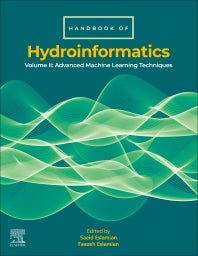Freshly Printed - allow 10 days lead
Couldn't load pickup availability
Handbook of HydroInformatics
Volume II: Advanced Machine Learning Techniques
A fully comprehensive handbook that provides all the information needed on Advanced Machine Learning Techniques
Saeid Eslamian (Edited by), Faezeh Eslamian (Edited by)
9780128219614
Paperback, published 9 December 2022
418 pages, 100 illustrations (20 in full color)
23.5 x 19 x 2.6 cm, 0.45 kg
Advanced Machine Learning Techniques includes the theoretical foundations of modern machine learning, as well as advanced methods and frameworks used in modern machine learning. Handbook of HydroInformatics, Volume II: Advanced Machine Learning Techniques presents both the art of designing good learning algorithms, as well as the science of analyzing an algorithm's computational and statistical properties and performance guarantees. The global contributors cover theoretical foundational topics such as computational and statistical convergence rates, minimax estimation, and concentration of measure as well as advanced machine learning methods, such as nonparametric density estimation, nonparametric regression, and Bayesian estimation; additionally, advanced frameworks such as privacy, causality, and stochastic learning algorithms are also included. Lastly, the volume presents Cloud and Cluster Computing, Data Fusion Techniques, Empirical Orthogonal Functions and Teleconnection, Internet of Things, Kernel-Based Modeling, Large Eddy Simulation, Patter Recognition, Uncertainty-Based Resiliency Evaluation, and Volume-Based Inverse Mode.
This is an interdisciplinary book, and the audience includes postgraduates and early-career researchers interested in: Computer Science, Mathematical Science, Applied Science, Earth and Geoscience, Geography, Civil Engineering, Engineering, Water Science, Atmospheric Science, Social Science, Environment Science, Natural Resources, Chemical Engineering.
35. Bayesian Estimation
36. Cloud and Cluster Computing
37. Computational and Statistical Convergence Rates
38. Concentration of Measure
39. Cross Validation
40. Data Assimilation
41. Data Fusion Techniques
42. Deep Learning
43. Empirical Orthogonal Functions
44. Empirical Orthogonal Teleconnection
45. Error Modeling
46. GARCH Time Series Analysis
47. Gradient-Based Optimization
48. Internet-Based Methods
49. Internet of Things
50. Kernel-Based Modeling
51. Large Eddy Simulation
52. Markov Chain Monte Carlo Methods
53. Minimax Estimation
54. Model Fusion Approach
55. Monitoring Quality Sensors
56. Nested Reinforcement Learning
57. Nested Stochastic Dynamic Programming
58. Nonparametric Density estimation
59. Nonparametric Regressions
60. Operational Real-Time Forecasting
61. Patter Recognition
62. Self-Adaptive Evolutionary Extreme Learning Machine
63. Stochastic Learning Algorithms
64. Supercomputing Methods (Parallelization/GPU)
65. Transient-Based Time-Frequency Analysis
66. Uncertainty-Based Resiliency Evaluation
67. Volume-Based Inverse Mode
68. WebGIS
Subject Areas: Water supply & treatment [TQSW]


